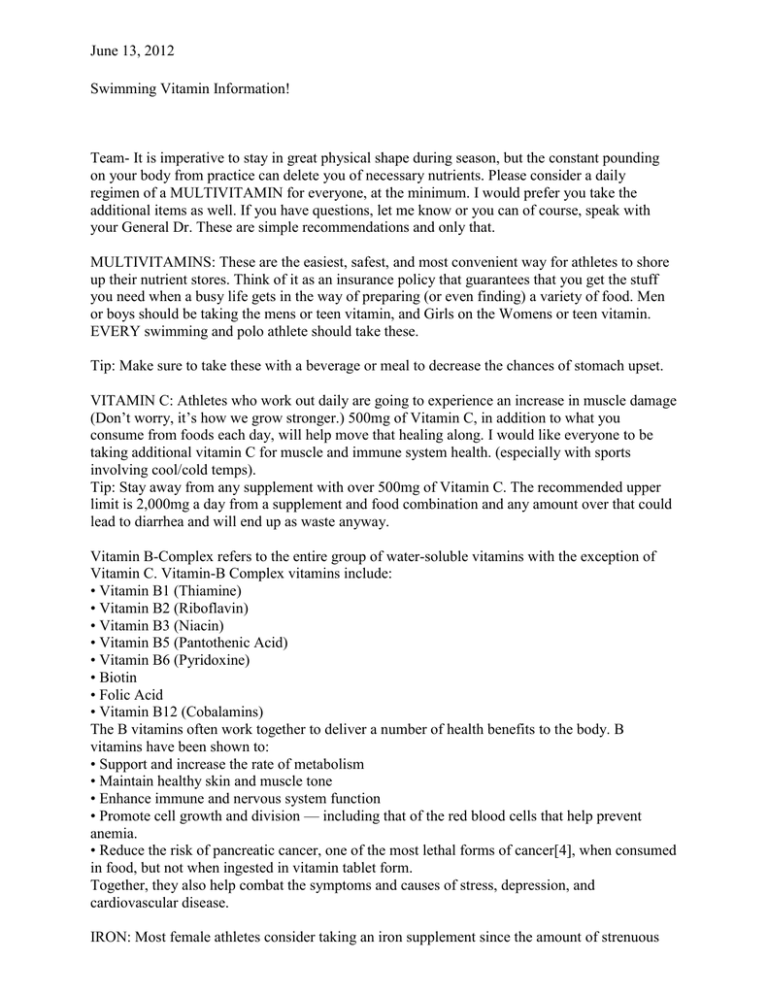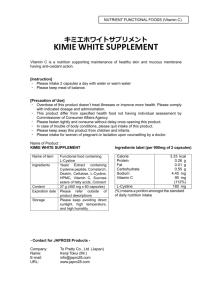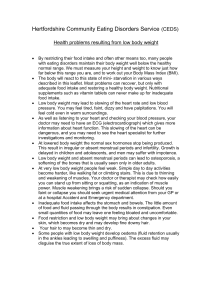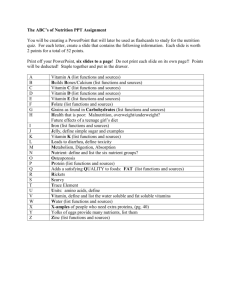Vitamins - TeamUnify
advertisement

June 13, 2012 Swimming Vitamin Information! Team- It is imperative to stay in great physical shape during season, but the constant pounding on your body from practice can delete you of necessary nutrients. Please consider a daily regimen of a MULTIVITAMIN for everyone, at the minimum. I would prefer you take the additional items as well. If you have questions, let me know or you can of course, speak with your General Dr. These are simple recommendations and only that. MULTIVITAMINS: These are the easiest, safest, and most convenient way for athletes to shore up their nutrient stores. Think of it as an insurance policy that guarantees that you get the stuff you need when a busy life gets in the way of preparing (or even finding) a variety of food. Men or boys should be taking the mens or teen vitamin, and Girls on the Womens or teen vitamin. EVERY swimming and polo athlete should take these. Tip: Make sure to take these with a beverage or meal to decrease the chances of stomach upset. VITAMIN C: Athletes who work out daily are going to experience an increase in muscle damage (Don’t worry, it’s how we grow stronger.) 500mg of Vitamin C, in addition to what you consume from foods each day, will help move that healing along. I would like everyone to be taking additional vitamin C for muscle and immune system health. (especially with sports involving cool/cold temps). Tip: Stay away from any supplement with over 500mg of Vitamin C. The recommended upper limit is 2,000mg a day from a supplement and food combination and any amount over that could lead to diarrhea and will end up as waste anyway. Vitamin B-Complex refers to the entire group of water-soluble vitamins with the exception of Vitamin C. Vitamin-B Complex vitamins include: • Vitamin B1 (Thiamine) • Vitamin B2 (Riboflavin) • Vitamin B3 (Niacin) • Vitamin B5 (Pantothenic Acid) • Vitamin B6 (Pyridoxine) • Biotin • Folic Acid • Vitamin B12 (Cobalamins) The B vitamins often work together to deliver a number of health benefits to the body. B vitamins have been shown to: • Support and increase the rate of metabolism • Maintain healthy skin and muscle tone • Enhance immune and nervous system function • Promote cell growth and division — including that of the red blood cells that help prevent anemia. • Reduce the risk of pancreatic cancer, one of the most lethal forms of cancer[4], when consumed in food, but not when ingested in vitamin tablet form. Together, they also help combat the symptoms and causes of stress, depression, and cardiovascular disease. IRON: Most female athletes consider taking an iron supplement since the amount of strenuous exercise they do coupled with their generally small intake of red meat can make them iron deficient. What most women don’t understand is that they need a lot more iron than men, 18mg per day compared to 8mg for a guy. Vegetarian athletes also need additional iron (nearly double the amounts above) since iron from plant sources isn’t absorbed as easily as meat sources. Iron’s a tricky mineral; too much can lead to constipation, loss of appetite, and vomiting. Tip: If taking an iron supplement, don’t pop it along with dairy foods or teas; both contain elements that block considerable amounts of the mineral from being absorbed by your body. Citrus foods, however, optimize iron absorption. CALCIUM: A study women athletes consume up to 20 percent less calcium than their recommended daily minimum of 1,000mg. On top of that, the body excretes a sizable amount of calcium through sweat, a condition that can put the body in a calcium deficiency that could lead to bone density loss. For women and vegetarian men, a calcium supplement is a good call, assuming you’re already ingesting calcium-rich foods (dairy, fortified juices, green vegetables) to obtain the recommended 1,000 mg each day. Tip: Vitamin D helps the body absorb calcium. You can get all you need simply by exposing your skin to the sun for 15 minutes, twice a week. Also note: the body can only process so much calcium at once, so limit your intake to no more than 500mg at a time. Any more could negatively affect normal kidney function and result in damage to your blood vessels and joints. Hard training and competition places special demands on an athlete's body. A sound diet will be the foundation of providing the nutrients needed. The following are the suggested level of vitamin and mineral intake: • Vitamin A (carotene) - recommended intake 5000 IU per day • Vitamin B1 (thiamine) - recommended intake 50 mg per day • Vitamin B2 (riboflavin) - recommended intake 15 mg per day • Vitamin B3 (niacin) - recommended intake 25 mg per day • Vitamin B5 (pantothenic acid) - recommended intake 10 mg per day • Vitamin B6 (pyridoxine) - recommended intake 15 mg per day • Vitamin B12 (cobalamin) - recommended intake 6 mcg per day • Biotin - recommended intake 500 mcg per day • Folic acid - recommended intake 1 mg per day • Vitamin C (ascorbic acid) - recommended intake 3000 mg per day • Vitamin D - recommended intake 600 IU per day • Vitamin E - recommended intake 1200 IU per day • Vitamin K - recommended intake 125 mcg per day • Calcium - recommended intake 1000 mg per day • Chromium - recommended intake 300 mcg per day • Copper - recommended intake 3 mg per day • Iodine - recommended intake 150 mcg per day • Iron - recommended intake 30 mg per day • Magnesium - recommended intake 500 mg per day • Manganese - recommended intake 5 mg per day • Phosphorous - recommended intake 1000 mg per day • Selenium - recommended intake 150 mcg per day • Zinc - recommended intake 25 mg per day







